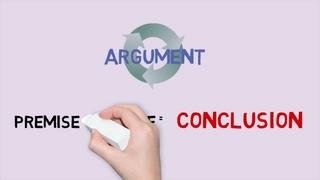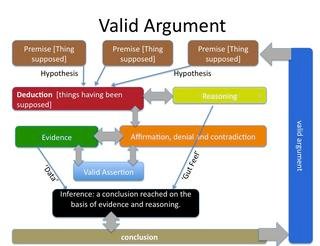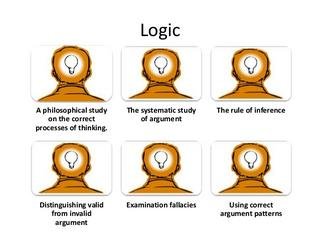ARGUMENT: What It Means To Philosophers
Today, I will be ushering you into one of the critical aspects of philosophy and a good tool every philosopher does not joke with. Philosophy is a discipline with many branches and it touches almost every discipline you can think. Every fields are treated as sub topics in philosophy and they are discussed under philosophy of infrastructure or Philosophy of other disciplines. Here we have courses like: Philosophy of Education, Philosophy of Science, Philosophical Psychology, Philosophy of Mathematics, Philosophy of Language, etc,. This explains why philosophers have ideas about all disciplines. Although we also do our own individual research because knowledge is not static.

I will be sharing with us a topic under Logic which is argument. I have heard many people say ‘ I don’t like argument, don’t let us argue’. I get confused each time I hear that because arguing is not a bad thing neither is it a means to show superiority. As a philosopher, it is some how ‘impossible’ to make a claim without arguing for or against the claim. Every thesis or philosophical work is founded on logical reasoning and this is a tool acquired under argument.
To discuss argument, we need to know the meaning of logic. Logic is from the Greek word logos which means reason, argument, Principles or idea. Logic is the study of human reasoning with the intention to infer good reasoning from bad reasoning.
An argument is a series of statements with premisses and conclusion. The premisses serve as the foundation on which the conclusion is drawn. The aim or an argument is to provide relevant grounds and reasons to support the claims leading to your conclusion.
Unlike the layman conception of the word argument, for philosophers, it is a tool we use in logic to show a claim is either wrong or right, sound or unsound.
Terms used in logic are cannot be subjected to pure English query. They are developed to test human reasoning beyond the normal use of the words. In Mathematics, for instance, we have symbols like 1, X, + = - % etc. These symbols represent something E.g
1 means one
X means Multiplication
+ means plus
= means equals
- means subtraction
% means percentage
In logic, we have symbols like ⊃ . ~ ≡ V
⊃ means horseshoe or implies
. means ‘and’
~ means negation
≡ means equivalent
V means disjunction
The above suggests we use symbols everyday without knowing they are symbols.
In logic, there are two types of argument and they are deductive and inductive.
Deductive argument follows a strict pattern which the premisses must always provide ground for the conclusion. That is, it impossible for the premisses of a deductive argument to be true and the conclusion to be false. So premisses provide support for the conclusion.

Examples:
(1)
All fish lives in water
Whale is a fish
Therefore: Every whale lives in water
Whales fall under the category of fish and since fish lives in water, it follows conclusively that whales live in water.
(2)
All men are mortals
Smyle is a man
Therefore: Smyle is a mortal
Smyle is a man and since all men are mortal, it follows conclusively that smyle is a mortal
A deductive argument can either be valid or invalid. A valid argument is that which the conclusion is drawn from the premisses. An invalid argument is that which the premisses do not provide support for the conclusion.
The examples above are valid arguments. See below for an invalid argument:
Criminal actions are illegal
All murder trials are criminal actions
Therefore: All murder trials are illegal. (Example from I.M Copi, Introduction to Logic, 1986.)
The above argument is an invalid one. The reason is, the term ‘criminal actions’ is used in two different ways.
In philosophy, we say such argument committed fallacy of equivocation. Fallacy of equivocation is committed when an ambiguous term is used in more than one sense, thus making the argument misleading.
Inductive argument or reasoning is an inference we draw by observing certain phenomena and then make a conclusion from them. The conclusion inferred from these phenomena is probable.

Example:
It rained on Monday
It rained on Tuesday
It rained on Wednesday
It rained on Thursday
Therefore: It will rain on Friday.
By observing past occurrences, we make probable conclusion that it will rain the following day.
Inductive arguments are either true or false (not valid or invalid). The strength or weakness of the argument is premised on the past occurrences. This is why we say its conclusion is probable – it could be true or false.
If you claim that John is a man, we will ask you: what makes you think 'he' is a man? Your responses could be because of 'his' look, physical structure, 'he' always shows interest in ladies, etc,. Such conclusion is actually probable because John can in fact be a woman because look and physical structure does not make a being male or female any longer. We will need more than appearance to draw such conclusion.
So see argument for what it is. Logical reasoning by drawing claims to further explain another claim by way of proving the illogicality in it. Its aim is to differentiate good reasoning from a bad reasoning.
Thanks for reading. Your boy @smyle the philosopher
Very good Philosophy lesson, Thanks. What I concluded is: Philosophy is the result of the interaction between mind and concepts (represented by words or symbols). The Interaction is the Argument that some hate. People hate arguing because it is a start to violence in many people lives. Philosophers love arguing because it is a path to the truth and peace.
true but the way i see it (the problem) is that nothing serious has been written in western philosophy since Plato, Aristotle and Socrates (and a few others). For example, Plato was against democracy and asserted that it always descends into despotism... yet today we have a global democracy imposing peace by arms and 10 or so people as much rich as the developing world. Plato was RIGHT!
I am of the opinion that the last 1500 years of philosophy must be rewritten, too many have tried to bypass ancient philosophy and now we are facing a crisis as a result
Democracy is 2 wolves and a sheep discussing about diner. :)
It is time to fight back

yes... but also realize that everything must be rebuild from scratch... intellectually if we ever want technology to serve man
MY BLOG: The Future Is Now: How Can The Processing Of Fear Lead To Peace and Enlightenment
The planet lives in a dystopian reality, so anything outside this reality is deemed utopian ?
This post is educating. Thanks bro
You are welcome and thanks for reading!